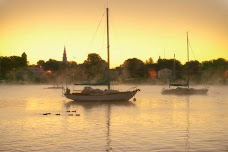
Are we all done talking about "food miles" and carbon footprints yet?
Don't get me wrong: I'm all for eating local when it comes to certain critical foods like strawberries, asparagus and tomatoes. Right now, I'm counting the days till I can pick my own strawberries at great local farms like Four Town in Seekonk and Sweet Berry in Middletown.
But anyone who thinks that forgoing foods that have come from other places in the country or the world is going to save the world is just plain loco.
"Big Foot," an excellent article in The New Yorker some months ago, should put to rest the faddish and simplistic notion that "eating local" is going to help save the planet. Quite the contrary, as it turns out. (Among its interesting points: Because there is more sunshine in certain parts of the world, and therefore a longer growing season, it is actually more energy efficient overall to grow foods where they grow best on the planet, rather than "locally," where the additional energy costs of things like fertilizers far outweigh the energy costs of shipping. And that's not even to mention the sheer impracticability of growing enough food in a heavily developed state like Rhode Island to feed all the people who live here.)
What this means to me as a Rhode Islander is that I can feel good about drinking the French, Italian, South African and California wines I much prefer anyway over the additive-laced stuff that is produced around here. Rhode Island wine-growers have to add the additives because the climate around here is not the world's best for wine-growing. Hello! There's a reason they call it Bordeaux.
Still, some people will go oooh! just because it's "local," just as they do for local seafood. They confuse "local" with "fresh." Fresh is good; local isn't always. Take clams. Over the past few weeks, Retired Guy and I have been engaged in a project of vast scope to discover what are the "Top Ten Fried Clam Shacks" in Rhode Island. This entails stopping at likely clam places that we come across in our travels and ordering a box or a clam roll to sample. (Look for the results coming up soon on Projo.)
 What I've noticed is that the current fad for "localism" has made fried-clam purveyors skittish about admitting that their clams, in most cases, come from Maine. They hesitate, just for a second, when I ask where they get their clams, while they try to assess whether the answer I want to hear is "Rhode Island."
What I've noticed is that the current fad for "localism" has made fried-clam purveyors skittish about admitting that their clams, in most cases, come from Maine. They hesitate, just for a second, when I ask where they get their clams, while they try to assess whether the answer I want to hear is "Rhode Island."The truth is that the best-tasting clams and lobsters come from as far north as you can get them: Maine or Canada. The water is colder there, not to mention a whole lot purer than Narragansett Bay. (Check out today's front page Providence Journal story: Are our lobsters casualties of the war on mosquitoes? about the possible effect of the larvicide methoprene on the Bay.)
In most cases, clams for fried clams are frozen anyway, so it doesn't matter how far they've traveled to get here. Right now, there's a red tide alert in many parts of nearby Massachusetts, meaning that no clams are safe to eat from there. While the red tide algae doesn't typically spread south of Cape Cod, have you looked at the "shellfish closings" map that's part of the daily weather report in the newspaper? Those big dark blue areas that wax and wane with the rainfall totals mean that those parts of the local shoreline are too polluted to take clams from.
Well, excuse me for doubting, but I'd rather not eat a clam that someone in Rhode Island's state government has decided is clean enough today when it wasn't yesterday. So when I'm standing at that clam shack window asking, "Where are your clams from?" I don't want to hear, "Oh, they're local." I want to hear, "Maine."
Idea for bumper sticker: "Think Globally, Not Locally." Every food is local somewhere.
Can we all please stop talking about "carbon footprints" now?
Top photo: Evelyn's in Tiverton (clams from Ipswich, Mass.); lower photo: Flo's in Middletown (clams from Maine).







